#why is my tag for malik's dad 'hank ishtar' it's undermining how overly gd serious this post is
Explore tagged Tumblr posts
Text
on fathers and sons - an index of YGO abuse narratives
When discussing Noa’s arc, it seems like people place a lot of emphasis on this moment and declaration from Seto:
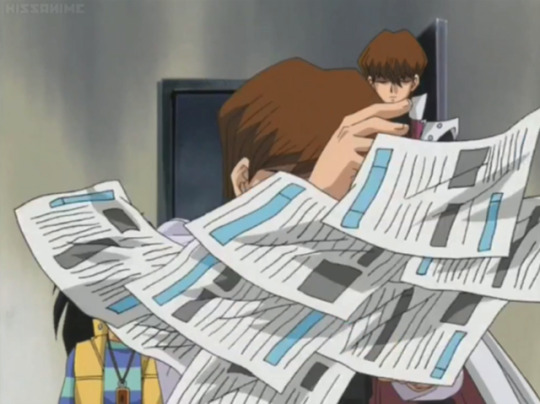

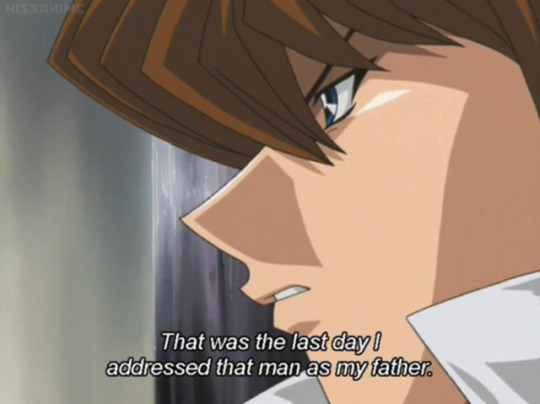
It’s a very stark and strong moment - Seto’s rejection of Gouzaburou, and I think it’s right to take this into account. But I think maybe we should be putting just as much, if not more weight, in the sequences in Noa’s arc following this. Particularly in the structure of Seto and Noa’s duel:


Make no mistake. This is a duel set up to run on Gouzaburou’s terms. Seto and Noa are fighting in the understanding that there’s only one living body between them, and the winner will have proven themselves superior and the rightful heir to Kaiba Corp. They are fighting for the right to Gouzaburou’s legacy, and the loser will be left behind in VR. To Lose is to Die.
Continued under the cut:
Noa believes he has the upper hand, both because he was born and bred for this job. And because he outstripped the boundaries of humanity when his mental capacities were enhanced living in VR.

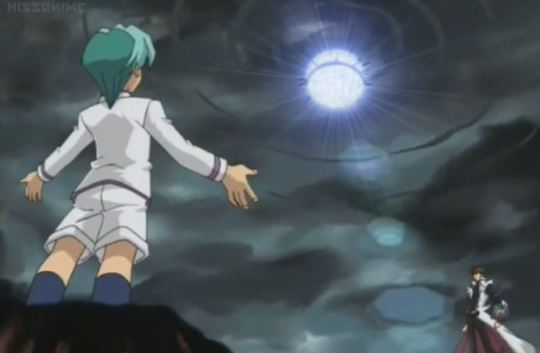
Seto is not impressed with this line of reasoning.

Not only did Seto put in the hard work and struggle to inherit Kaiba Corp. Noa’s already dead. He’s already lost once by Gouzaburou’s terms. Seto accepts the challenge to duel in the understanding that Noa was the loser once, and a loser once is a loser always.
...Both ultimately betray Gouzaburou’s teachings during this duel - Noa by cheating, and Seto by both admitting there are things more important than his own life on the line here in deciding to save Mokuba, and in Atem helping him finish the duel after he’s petrified. (Notably the BC final duel also subverts Seto’s expectations for loss, in Atem’s ability to find a method to save Malik’s life in their shadow game.)
But before that moment of truth, you’ve certainly got a lot of trash talk, some of which seems to betray certain line of reasoning from Seto.


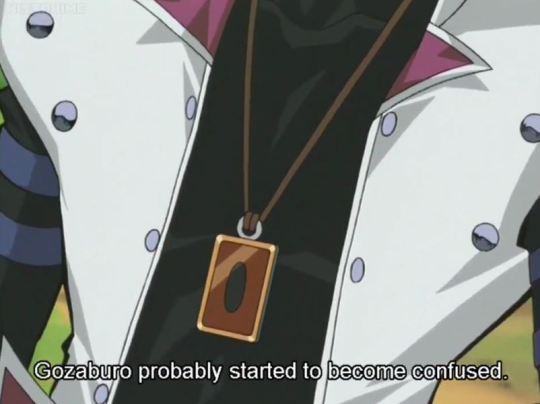
[Insert long speech about the value of humans having to struggle against the chaos of the real world versus this VR of Noa’s creation.]
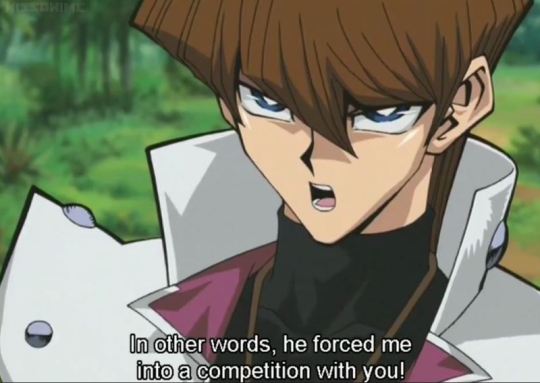

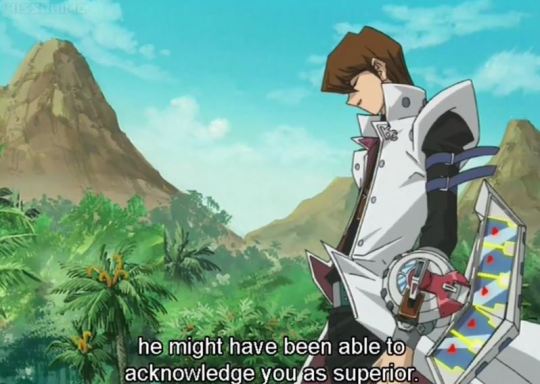
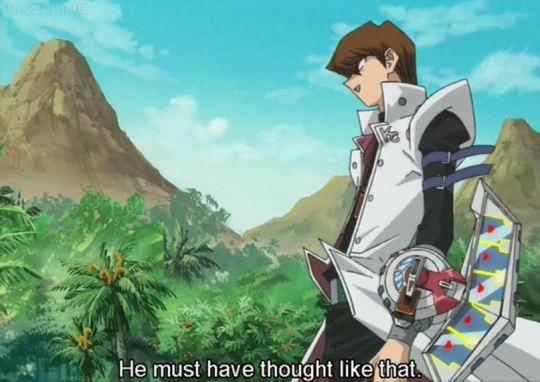



“Of course Gouzaburou loved me more! Gouzaburou must have been confused if he even considered that you might bet the better or superior compared to me! How pathetic of either of you to even doubt! He acknowledged me as superior - and the result of duel is going to prove him right!”
Okay, I’m being hyperbolic but, contrary to what you’d believe from the first set of caps, I think what Seto says here, combined with the circumstances surrounding this duel, betray a certain amount of Seto deeply desiring recognition and acknowledgement from Gouzaburou. Or at least recognition and acknowledgement for having the qualities that Gouzaburou would have valued.
I’ve seen people pan the direction of this arc, and Noa as a villain, specifically on this basis. Seto should, in theory, not care about what Gouzaburou thought, and thus not care about stomping out Noa’s desire to prove himself the worthy son. Gouzaburou was his abuser, no real parent to Seto, and therefore Seto should not care. And, make no mistake, I think Seto’s hatred for his stepfather is clearly documented.
But I’m going to defend how Noa’s arc frames this conflict and Noa as a villain, and the idea that Seto may have feelings regarding Gouzaburou that are rooted in a desire for acknowledgement and affection. There is very little of Gouzaburou in manga canon, nothing that would generally suggest Seto having any conflicting fond feelings for him - although I think the fact that Seto continues to make decisions to build and destroy duel towers in the memory of Gouzaburou might be indicative of the fact that he cares a little too much.
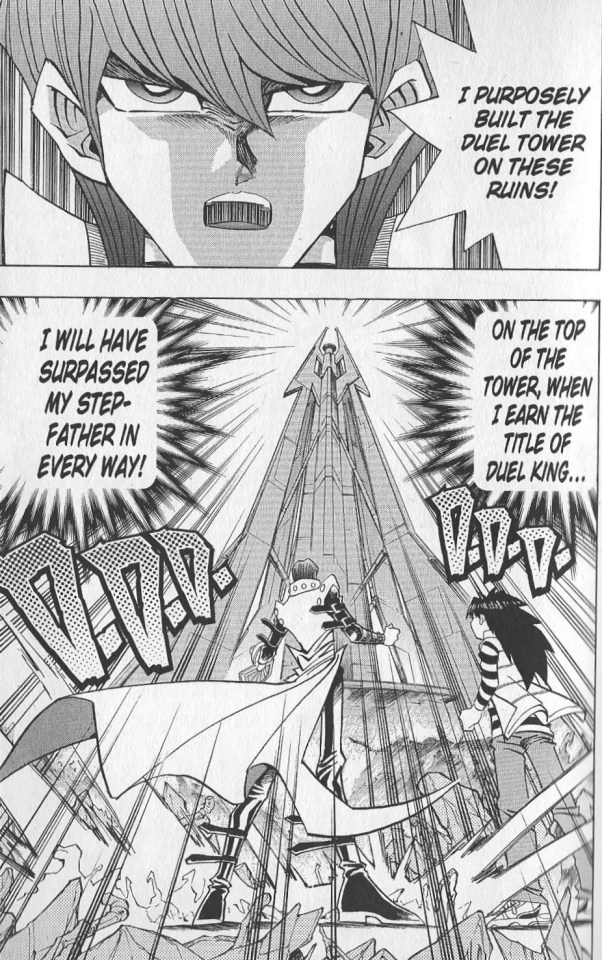
But the reason I think this is a particularly good extrapolation from manga canon, is that it matches the themes we see in REPEATEDLY in the narratives of abuse that ygo offers to us.
I’m sure you’re aware that the surplus of absentee and abusive dads in DM, it’s… a bit of a joke. Even for characters for which you can assume a somewhat normal family life, such as Anzu and Honda, there’s a kind of sense in the story of a lack of presence from their parents. Which I would expect in a manga filled to the brim with ~adventure~ How are the characters gonna pile onto ships and blimps and go traipsing off to Egypt if their parents are always bugging them about school?

Well, I guess Yuugi has somehow managed to make it onto ships and blimps even with his mom bugging him about school…
There are multiple layers to this – The fact that absentee dads have become a norm in Japan given the increasing demands of corporate life. The fact that in a measure of personal experience a dead parent is much the same as an absent one – but dead parents make for better narrative drama. The fact that we never see Atem and his father together and are instead relayed an inherently biased posthumous recollection of their relationship. And the fact that there’s a kind of woefully imbalanced attribution of certain roles onto certain demographics of character. On that last point – I think it’s telling that, as a whole, it’s elder male children that are victimised in Takahashi’s narratives of family. It’s telling that mothers have an even smaller presence in Yu-Gi-Oh than fathers (and that when Yuugi’s mom hits him with a ladle up there, it’s framed as a joke). And it’s telling that father-daughter relationships are also very poorly defined. I’m going to give Shizuka a pass given the discrepancy in hers and Katsuya’s living situations, but I think it’s a pretty huge oversight that Isis’s relationship with her father is as unexplored as it is. (If I’m being brutally honest, I don’t think Takahashi empathises enough with his female characters to understand how they might, also, be deeply unhinged or affected by trauma.)
But, although I can critique the way Takahashi repeatedly approaches this same narrative – the narrative of a young man at odds with a cruel, violent, and single-minded father – I can’t help but love it, as I am perpetually surprised and enamoured with the amount of understanding, empathy, and realism Takahashi allows to his victims. This cuts in a lot of different ways, but there is one aspect that I particularly appreciate:
He not only understands that it’s normal for abused children to be angry and vengeful, but that it’s also normal for them to care about their parents regardless and to desire reconciliation with them, no matter how unlikely or misguided. And they are not shamed for it.
--
Jounouchi ended up being the prototype for this character in ygo canon, although these threads were dropped by the time the card game started. We see the gang caught of guard by an attack meant for Jounouchi.

And Honda confirms this behaviour is typical of Jounouchi’s dad.
But when we see Jounouchi’s attitude towards his dad, it’s warm and full of forgiveness. He enters a game show with the intention of winning money to pay off his father’s debts-

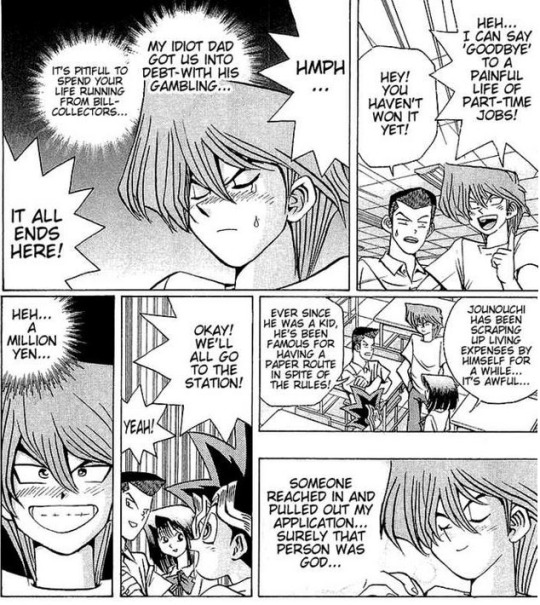

-specifically on the hopes that, by winning, he’ll be able to repair their relationship, and live together happily.
--
Gouzaburou was introduced next into the narrative, but Otogi and his father followed not far after.

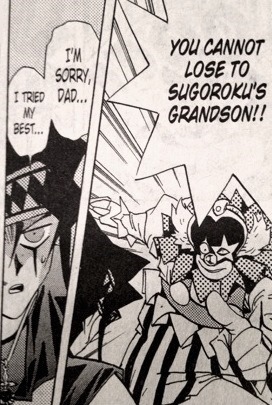
Otogi’s father, Mr Clown, hits and berates him.

But, even so, Otogi continues to seek revenge on his father’s behalf.

And, beyond that, he’s very mild and apologetic.
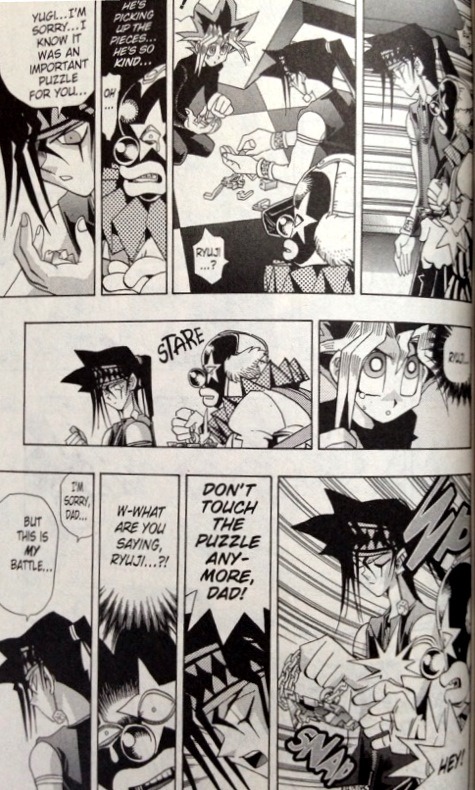
Even when he’s pushing back against his dad, he’s apologising. This is framed as a harsh moment of rebellion - one that shocks Mr Clown - but all Otogi does is disobey his father’s request, and snatch the puzzle’s chain from his hand. And he’s still apologising while doing so. I think it goes to show how uncharacteristic it is for Otogi to express any harshness towards his father.

And, even when Mr Clown renounces Otogi as his son-

We see Otogi afterwards (on Jounouchi’s urging) hurry to cradle his father in his arms and and lead him to safety, and away from the fire that’s started in the Black Clown game shop.
But maybe the most persuasive show of Otogi’s desire to reconcile with his dad, is that he succeeds. They seem to be on good terms in Darkside of Dimensions, have opened a new business at the shopping plaza together.

--
I think Malik embodies this pattern most completely though. His abuse is portrayed with imagery more gruesome than the other characters on this list. His father’s whip, and the scars that were carved onto his back.
I’ve seen people operate under the impression his beef with the Pharaoh has to do with being confined to life underground, or having his back mutilated as part of the tombkeeper ritual, or for twisting his father’s personality into something terrible. I’m not going to say that those could not also be factors in Malik’s motivations. But the primary motivation for his behaviour in BC, is textually that he believes the Pharaoh’s spirit is responsible for killing the father that he loved. And being unable to accept the fact that the father he loved was also the father he hated enough to kill himself.
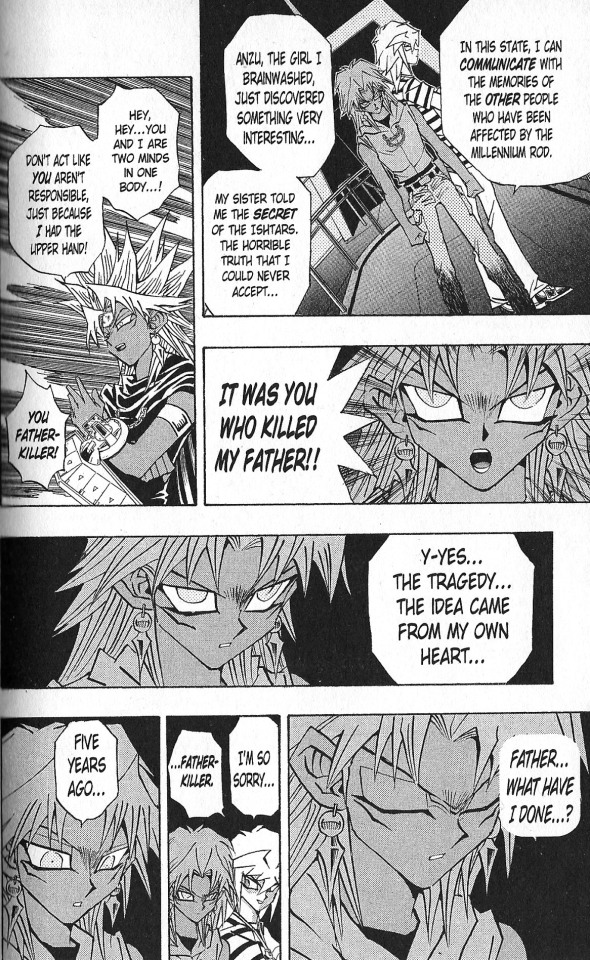

(Also, wow, panels that make much more sense after DSoD. If Bakura was surprised because Shada reappeared despite having been killed 3000 years ago, why was he not surprised to see modern incarnations of Isis and Set. Except in addition to killing Shada, he also killed Shadi ~5 years ago. Now his surprise makes sense.)
But, yeah, this vein is carried through to the end of Malik’s story arc. He’s not able to forgive himself for killing his father, no matter how abusive or terrible, he’s only able to decide, with encouragement from Rishid, that it’s preferable to keep on living.
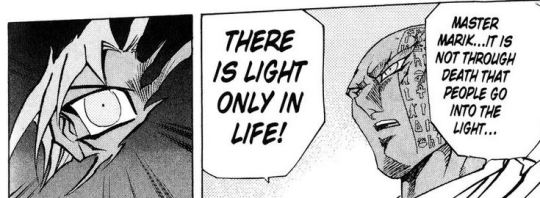

Anyhow, insofar as Seto goes, as I’ve said, there’s scant evidence to draw from regarding his feelings about Gouzaburou. But I think it’s prudent to consider, as with the rest of these characters, his feelings are probably not limited to disdain. According to Takahashi’s commentary, Seto does consider Gouzaburou a father and is has been deeply haunted by his involvement in Gouzaburou’s downfall and death. Taking it a step further, it’s entirely likely that, he feels some form of fondness for his lost parent. No matter how misguided and futile such feelings would be.
#Kaiba Seto#Kaiba Noa#Jounouchi Katsuya#Otogi Ryuuji#Malik Ishtar#Kaiba Gouzaburou#Hank Ishtar#why is my tag for malik's dad 'hank ishtar' it's undermining how overly gd serious this post is#meta#DeLurk words the meta#save me from this card game hell#cw: abuse#i pulled these caps from here and there and everywhere#the Otogi ones I took pictures of myself which is why they're so bad#but thanks again @nenya for getting me the ones for the YBakura & YMalik duel and of Seto in front of the duel tower#i'm so sick of this post. i refuse to look at it any longer.#*sends out for other ppl to look at instead*
202 notes
·
View notes